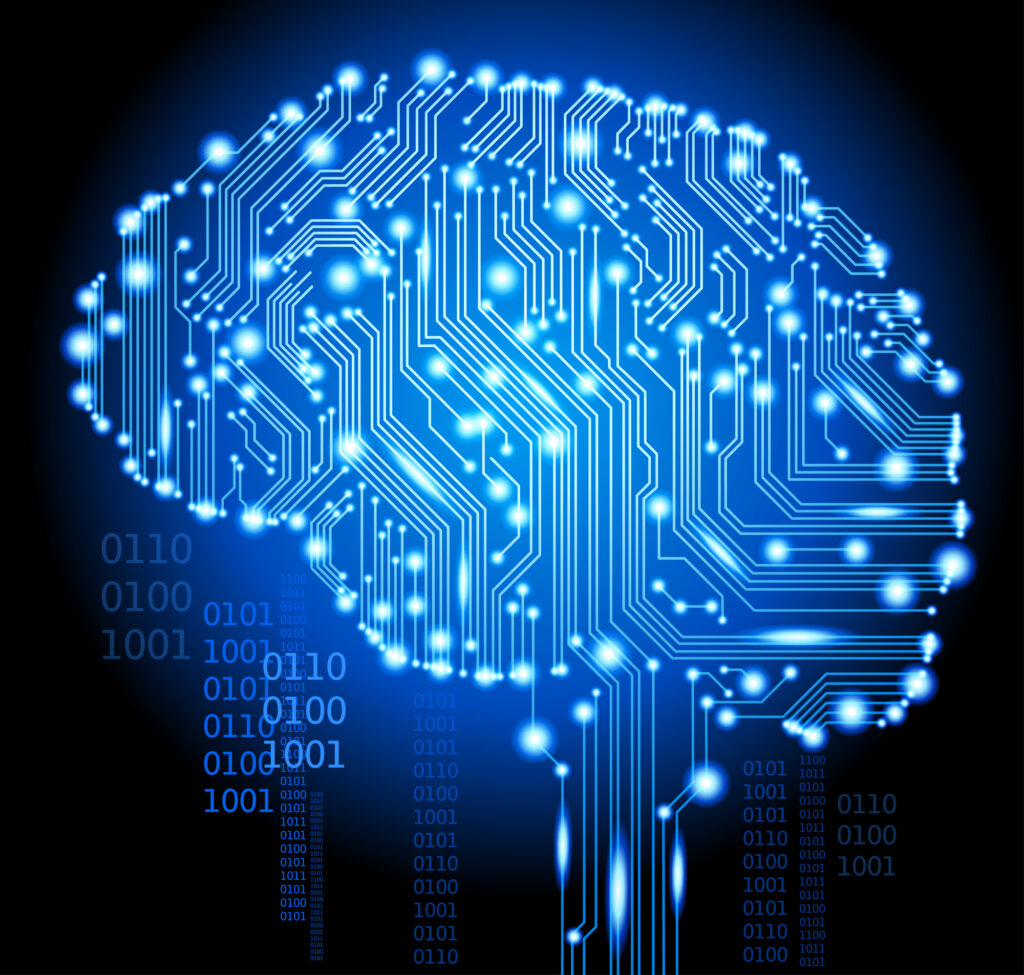Artificial intelligence (AI) is the new big thing in online advertising and brand building.
The AI-powered technology is used to create captivating content, gain actionable insight about target audiences, and outpace the competition in the digital market. Your business can improve its brand, increase its ROI, and form better connections with its audience by following suit.
The mere idea of implementing this groundbreaking, but complex technology can be intimidating. The digital marketing AI field has seen a flood of new tools, apps, and software solutions in the past few years. This can make it even more difficult to get started with AI.
Kobe Digital created this comprehensive guide to help you understand AI and digital marketing.
- What is digital marketing AI?
- How AI is changing the landscape of digital marketing
- Use cases of digital marketing AI
- AI adoption: benefits and challenges
- AI Marketing: Tips to help you introduce AI into your strategy
Let’s get started.

What is Artificial Intelligence (AI) in Digital Marketing?
AI, at its core, is a science that develops intuitive and innovative machines. The technology mimics human intelligence, while also thinking rationally and acting.
Artificial intelligence (AI) in digital marketing is simply AI solutions developed to assist with various marketing-related activities. Digital marketing AI, for example, can be used for any of the following tasks:
- Power chatbots
- Analyze campaign results
- Help with content creation
- Guide decision-making processes
Here are just a few examples of how AI can be used in digital marketing. As technology evolves, marketers will discover new and exciting ways of incorporating AI into brand-building and marketing efforts.
AI is reshaping the digital marketing landscape
Statista estimates that the global AI market will reach $2 trillion by 2030.
There are many ways to use AI in digital marketing. However, most marketers are using it for email marketing. By 2022, over 80% of marketing experts will have incorporated AI into their workflow. According to Capterra’s survey, 63% of respondents are using AI for email marketing. Let’s look at some of the other digital marketing AI cases that are changing the industry.

AI Use Cases in Digital Marketing
Chatbots
Chatbots were initially limited in their ability to generate responses. This could frustrate consumers who are looking for information about products or for support. The advancement of AI technology, including natural language processing algorithms (NLP), has greatly improved their capabilities.
Dynamic chatbots today can offer round-the-clock support to customers, answer many questions and collect data, among other things. They can reduce the workload of customer service teams, and increase business leads.
Chatbots are a key tool in marketing. They can assist consumers with finding additional information on products, services, or pricing at the time when they’re most interested in purchasing. They can also collect contact information like phone numbers and email addresses to be uploaded to a database.
Predictive Analysis
predictive analytics can be performed by AI to help your business make the most of all that data. While descriptive and diagnostic analytics are focused on what happened and why, predictive analytics provides insights into the actions that you should take to achieve your marketing goals and removes the guesswork from important marketing decisions.
You can use quantitative data instead of gut feelings and hunches to make better decisions. This will increase the effectiveness of your marketing campaigns. This will result in a higher return on investment and better campaign performance.
Content Personalization
AI technologies can analyze historical data in real-time and use the insights to provide personalized content to customers. AI web tools, for example, can show unique ads or suggest products based on a customer’s previous purchases.
It is impossible to overstate the power of personalization. McKinsey states that 71% of consumers want businesses to offer personalized interactions. Researchers found that companies that excel at personalization generate 40% more revenue.
Campaign Automation
Digital marketing AI automates all kinds of crucial processes. It can automate behind-the-scenes activities like gathering, sorting, and analyzing data and also set up and automate marketing campaigns.
Automation of campaigns and backend processes can help your team save time and money. You can spend more time on dynamic tasks such as conducting consumer research, planning the next big product launch, or creating quality content.
Even automating a few simple tasks can boost your productivity and help you grow your business.
AI in Digital Marketing: Benefits
You probably have already started to fantasize about the many ways in which digital marketing AI can revolutionize your branding strategies. Implementing some robust AI tools can have a significant impact on your business.
AI can help you achieve the following:

Get Actionable Insights Into the Customer Journey
AI allows brands to gain actionable insights about each segment of the customer’s journey, from brand recognition to purchase.
With the right AI, you can track individual customer journeys and get high-level feedback to help you focus on your big picture.
Optimize your campaign content
Great content is at the core of every marketing campaign. You need to ensure that your content is engaging, whether you’re using social media to create buzz for a new product, or providing your audience with informative, on-site blog posts.
AI technologies are especially effective in revamping and optimizing written marketing content. You can fix grammatical errors and ensure the correct keywords are used. You can also restructure sentences and make them more appealing to search engine algorithms.
AI can help you improve your content creation skills and give your SEO campaign a new lease of life. Every line of copy is valuable to your audience.
Automate Redundant Processes
The redundant manual processes waste time and energy. They also make your team less productive, which in turn damages employee morale. You can automate these tedious tasks using AI to reduce the workload of your team.
Automation capabilities of digital marketing AI reduce the possibility of human error. Your automation software will accurately transfer audience data into your marketing platform, then assist your team in putting it to good use with analytics tools, automated campaign management functionality, and other robust features.
Focus on More Specific Segments
Audience segmentation is a process that divides your target audience into subgroups. This allows you to tailor content to each group, based on their needs and goals.
AI tools can be used to segment your audience by a variety of factors, including location, income level, occupation, education, and age. Once you’ve done this, you can then deliver personalized experiences for each group using front-end AI marketing.
Save time
Imagine how productive you would be if suddenly you could eliminate several hours from your weekly task list. You can achieve this with digital marketing AI tools. AI tools can be integrated into your current tech stack to assist in a wide range of marketing tasks.
You can save hours by using fully-featured software to streamline reporting and data analysis processes, automate the intake functions and speed up content creation workflows.
Reduce costs
AI solutions can provide direct and indirect cost savings. AI can help you save money on labor costs by automating key tasks. The more functions that you automate, then the greater the cost savings.
In the second case, you will optimize your campaigns while reducing waste. Predictive analytics can be used to measure the effectiveness of future marketing material and make more strategic investments in advertising.
AI integration will increase your ROI, and you can improve virtually all marketing metrics. You can generate more leads, improve conversion rates and boost your revenue.
The Roadblocks to AI Implementation in Digital Marketing
AI is a powerful tool that can bring a lot of value to any business. However, there are pitfalls that you may encounter when integrating AI into your operation.
Here are some of the potential obstacles and ways to overcome them.

Initial Investment Costs
Initial costs can be high when implementing an AI-powered data management and marketing solution. You will also need to hire an outside team to help you configure the platform and migrate your data.
The initial costs of the investment will be offset in the months that followed by the increased ROI. However, if cost is a concern, you can consider a few alternatives.
Consider purchasing a standalone marketing tool instead of an integrated platform and incorporating it into your strategy. You can buy other standalone tools if you’re satisfied with the ROI. Or, go all-in and implement an integrated solution.
Poor Data Quality
Imagine AI algorithms as finely-tuned racing cars. If you fill a precision-engineered vehicle’s fuel tank with regular gasoline, it will perform much worse, even if the car doesn’t completely stall.
AI is no different. You may need to invest in a new data management tool before investing in AI. Algorithms require a lot of data for them to work properly.
Resisting Change
Some employees are simply not interested in change. They prefer to stick with the tools that they know and love, rather than learning how to use a new platform. You may have the final word on which tools and solutions are implemented, but you’ll need your entire team to be on board to get a good ROI.
You can address this hesitance in several ways. Include your team from the beginning. Tell them that you’re considering upgrading your technology stack. Explain why and ask for honest feedback.
You can then address their concerns by showing them how the new tools are beneficial to them and your business. Your team will be more open to change when they realize that AI can make their lives easier.
Compliance concerns
AI technologies are extremely efficient in harvesting consumer information. However, while having more data about your audience can be a benefit, it can also raise ethical and compliance concerns.
Over the past several years, state and national governments around the globe have been taking steps to protect consumer privacy, a movement that has led to the development of sweeping data protection regulations like the California Consumer Privacy Act and the General Data Protection Regulation.
Although the specific provisions vary from one activity to another, they all outline consumer privacy rights and how it impacts your ability to collect, store, or use your data. These laws have also created severe penalties that are meant to hold violators responsible.
Your business must create a plan for compliance and use artificial intelligence responsibly.
A Lack of Knowledge or Confidence
Influencer Marketing Hub, as part of its 2023 report on marketing professionals, surveyed to find out what was stopping them from adopting AI. About 41.9% of respondents said that they did not use the tools of AI because of a lack of understanding.
This lack of confidence in the solutions can lead to adoption hesitancy.
Consider scheduling a software demo and inviting your team to the event. If you show your team how intuitive and user-friendly the software is, they are more likely to use it.

Start with these 5 tips to get started in digital marketing AI
You are now ready to integrate digital marketing AI into your business. Here are some tips you can follow to ensure that your transition to artificial intelligence solutions is smooth.
1. Meeting with Your Team
It is easy to undermine trust by introducing technology tools that are not fully tested and then implementing them. This can lead to hesitation in adopting new technologies. Schedule a meeting before you make a final decision about AI. Be transparent with your team about your goals. Ask for feedback and let them know what solutions you’re considering. Also, ask which tools they think would be most valuable to your business.
Staff from different departments may have a unique perspective on marketing challenges that your company faces. They may have a unique perspective on the problem and be able to shed light on issues or needs that you missed.
2. You can assess your existing tech stack
The foundation of successful AI implementation is quality data. You must therefore evaluate your current technology stack before implementing any new solutions.
When evaluating your technology, pay particular attention to the data management tools you use. If necessary, start researching supporting technologies to determine if any legacy tools need to be replaced before, during, or after the deployment of your AI solution.
3. Define Your Why
You will be overwhelmed with choices as soon as you start a search on digital marketing AI tools. We suggest you first define your “why”, before beginning your research.
Identify what you want to achieve with artificial intelligence. List each goal, and then determine the tools and features that you will need to achieve your goals.
Finding the best solution will be much easier once you have done this. You can compare your wishlist of tools and features with the functionalities offered by each solution. You can eliminate a platform from consideration if it doesn’t meet your needs.
4. Select between Standalone or Integrated Solutions
Integrated solutions communicate and connect with your existing technology stack. These AI platforms are all-in-one and include many tools, functions, features, and capabilities. They can therefore meet your marketing requirements but are also more expensive and difficult to implement than standalone tools.
The opposite is true for standalone digital marketing AI apps: they are cost-effective and easy to use, but perform a very limited set of functions. A standalone app, for example, may only help with content optimization.
You should take into consideration two things when choosing between the different platforms: your budget, and your timeline. If you are on a budget and need to use AI right away, then a standalone app is the best choice. However, if your company has the resources and wants a complete solution, you should consider an integrated platform.
5. Take it Slowly
You might be worried that you are losing market share to other businesses that use AI-based digital marketing tools. Adopting AI technologies is a must, but rushing to implement new software could lead to disaster.
Do your research and involve your team. Start the implementation after you’ve set up the conditions for a smooth transition. Take advantage of any free trials or demos to help you choose the best solution for your company.
Digital marketing is essential for AI implementation.
Marketers around the globe have come to realize the importance of digital marketing AI, and they are adopting this technology at an incredibly fast pace. You need to adopt the same strategy if you want to remain competitive in the digital marketing industry.
You can implement new technology gradually, but you should start developing your digital marketing AI strategies. Use our practical tips, make a plan, and do some research. You can find the best AI tools for your company with a bit of diligence.
One last tip to accelerate your AI implementation: Partner with a digital agency that already uses AI. You can take your brand-building efforts to the next step by partnering with a digital marketing AI firm. This will also help you save on the costs of purchasing new technology. This is a very appealing proposition!